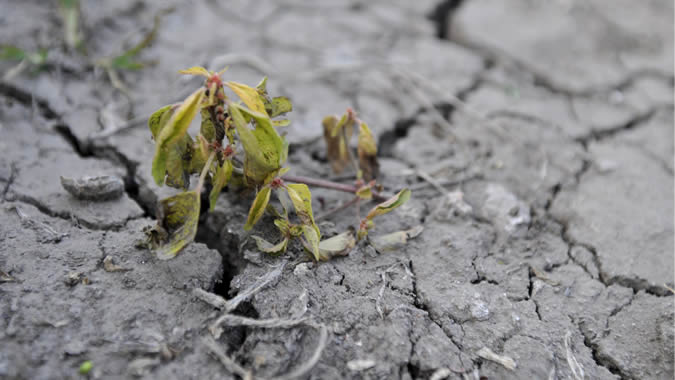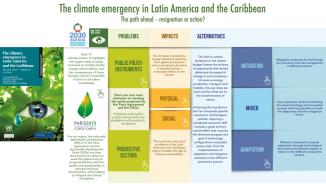infographic
Over the last decade, the Economic Commission for Latin America and the Caribbean (ECLAC) has developed several lines of research regarding climate change. One that stands out is a study of the economic and socioeconomic impacts of this phenomenon and its effects on the region's coastline.
"ECLAC is working very in depth on the issue of climate change and also on its link to strategic sectors of the region's economy. Climate change sometimes seems distant to us, but it is already generating direct effects on many countries," Alicia Bárcena, ECLAC's Executive Secretary, said recently.
On September 23, the so-called Climate Summit will be held in New York, convened by the United Nations Secretary-General, Ban Ki-moon. World leaders gathered there are expected to announce concrete actions to reduce polluting emissions and strengthen countries' climate resilience.
Another aim is to mobilize political efforts to achieve a binding agreement during the 21st Conference of the Parties to the United Nations Framework Convention on Climate Change (COP 21), which will take place in Paris, France, in 2015. This accord could start taking shape on December 1-12 of this year at the COP 20, which will be held in Latin America and the Caribbean-more specifically, in Lima, Peru.
Up to now, ECLAC has produced or given technical support to nearly a dozen reports on the economy of climate change as part of a regional project that seeks to promote the development of mitigation and adaptation policies tailored to this phenomenon. These have been coordinated by the Sustainable Development and Human Settlements Division.
Studies from Argentina, Chile, Colombia, Ecuador, Mexico and Uruguay stand out, as well as regional and sub-regional (Central America and the Caribbean) reports. In July, a study from Bolivia was launched and reports from Paraguay and Peru are scheduled to be released in the coming months.
At the same time, ECLAC has incorporated new variables of analysis into its research thanks to the Euroclima Programme -financed by the European Union-examining the effects of climate change and the measures to face it on employment, income distribution and poverty, among other socioeconomic aspects.
Another line of inquiry developed by the organization focuses on the vulnerability of the region's coastal areas. TheRegional Study into the Effects of Climate Change on the Coast of Latin America and the Caribbean has already presented six publications and a Web viewer of results. Likewise, ECLAC has produced various reports on cities' responses to climate change.
Finally, ECLAC, through its Division of International Trade and Integration, has carried out a project on carbon footprints and exports since 2012, one of the goals of which is to improve Latin American and Caribbean food exporters' ability to be prepared to future requirements that could be established by developed countries regarding the release of greenhouse emissions in productive processes.



